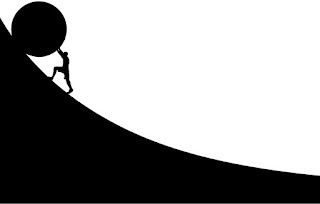Dear Awfully Big Blog Coworkers, I've been Awfully Bigly Absent the past two times I was supposed to write a blog post - I'm so sorry. I have no other excuse than "I simply didn't manage to make time for it" (not the same as 'I didn't have time to do it', which is very, very rarely true, of course.)
And now the deadline is upon me again, and I find myself, again, pressed against it. Yet this time I should have no excuse, because it's my 13th day of lockdown - I'm in France, where it started one week earlier than in the UK.
13 days of being stuck at home, with nothing but a computer and some books. I should have found the time, made the time for this blog post, shouldn't I ? I should also have found and made time for working on personal projects, getting on top of email, reading tons of books, finishing my next translation ahead of time, doing yoga, trying out new things. Resting.
I haven't, and it's only the guilt of a third missed month that pushes me to write this. The ardent desire to be able to say:
Here I am!
Present.
I'm thinking a lot about
presenteeism these days. In strict lockdown times, even though few people are still physically present for work, the imperative of online presence has rocketed. Absence was once frowned upon; but now, it seems to be, it has become absolutely intolerable.
By the way, I know it's worse for people who have to keep
doing their face-to-face work, and are at risk of contamination, or for those with kids. But even the working-from-home childfree crowd, of which I'm part, is being squeezed dry. I'm just astonished by the amount of work we're suddenly having to do for the university. I was supposed to be taking 3 weeks off entirely, to do school visits around Europe; of course, it all got cancelled. But since those 3 weeks were supposed to be non-working weeks, surely I should be taking things slowly, working only one or two hours a day, firing off a few emails? Impossible. There's simply
too much to do. Students to reassure, hierarchy to listen to, colleagues to check on and, most importantly, everything to change. All the teaching we'd prepared for face-to-face interaction has to be put online. The Open Days we'd planned have to go online now. The meetings, the vivas, the administrative stuff, the research projects, everything that was once a ticked-off task is becoming a task
again.
Hardly any out-of-office replies these days. No one is taking a break. It's not just presence that's being asked of us all, it's omnipresence. And to show that you are omnipresent, you need to be omnipresenteeist.
Omnipresenteeism is sneakier than just 'having more work to do'. Email traffic is unprecedented but it's far from necessary all around. Everyone is in front of their computer,
everyone is frantic, everyone is working hard to adjust to the situation
- and there's a sense that everyone is trying to show everyone how very
present they are, how very working-from-home-ready they are. Emails get sent about things that could absolutely wait, energies get deployed into projects that are not priority. Suddenly terrified that we might be found expendable, disposable, in that time when we're not showing our faces.
Writers and illustrators are no exception. We are expected to be all the more present as the physical world vanishes around us.
What, you haven't gone live on instagram daily, to provide now home-schooled children with readings, analyses, creative writing exercises? What have you been doing with your time? If you're an illustrator, you'd better be creating new colouring-in templates every day. Have you taken advantage of the lockdown to write more, to edit more, to move on with that project you've had in mind for years? How many words today?
You mean you've been stuck at home for 5 days, 13 days, 27 days, and you still haven't done any of that?
At the beginning of lockdown I was full of good intentions: I'd go through all my to-do list, I'd evaluated, within the first two days - bliss! - and then I'd work on university stuff in the morning, and then my translation (one hour a day), and then personal projects, and then skype calls with friends and family.
Nope. The to-do-list grew threefold in the first 24 hours, and now it's basically the barrel of the Danaids. Not a minute without a message on each platform - friends, colleagues, bosses, editors, readers, family. Another thing to do. Everyone in thrall to an anxiety of presence, of omnipresence, of overpresence.
This lockdown, I'm thinking today, is dystopian in more than one way. We're finding out what life would be like if the majority was working from home constantly. And it's not liberating - it's horrible. It's like having to remind the world of one's existence has become an additional item on the to-do-list; even better if it's creating more items for others on
their to-do lists.
Can't wait to be able to be a little bit more absent. Good luck everyone...
 Heather Dyer is a consultant in writing for children. She provides writing and publishing advice through The Literary Consultancy, The Writers' Advice Centre for Children's Books, and privately. If you’re ready for feedback on your work-in-progress contact Heather at heatherdyerbooks@gmail.com.
Heather Dyer is a consultant in writing for children. She provides writing and publishing advice through The Literary Consultancy, The Writers' Advice Centre for Children's Books, and privately. If you’re ready for feedback on your work-in-progress contact Heather at heatherdyerbooks@gmail.com. 












